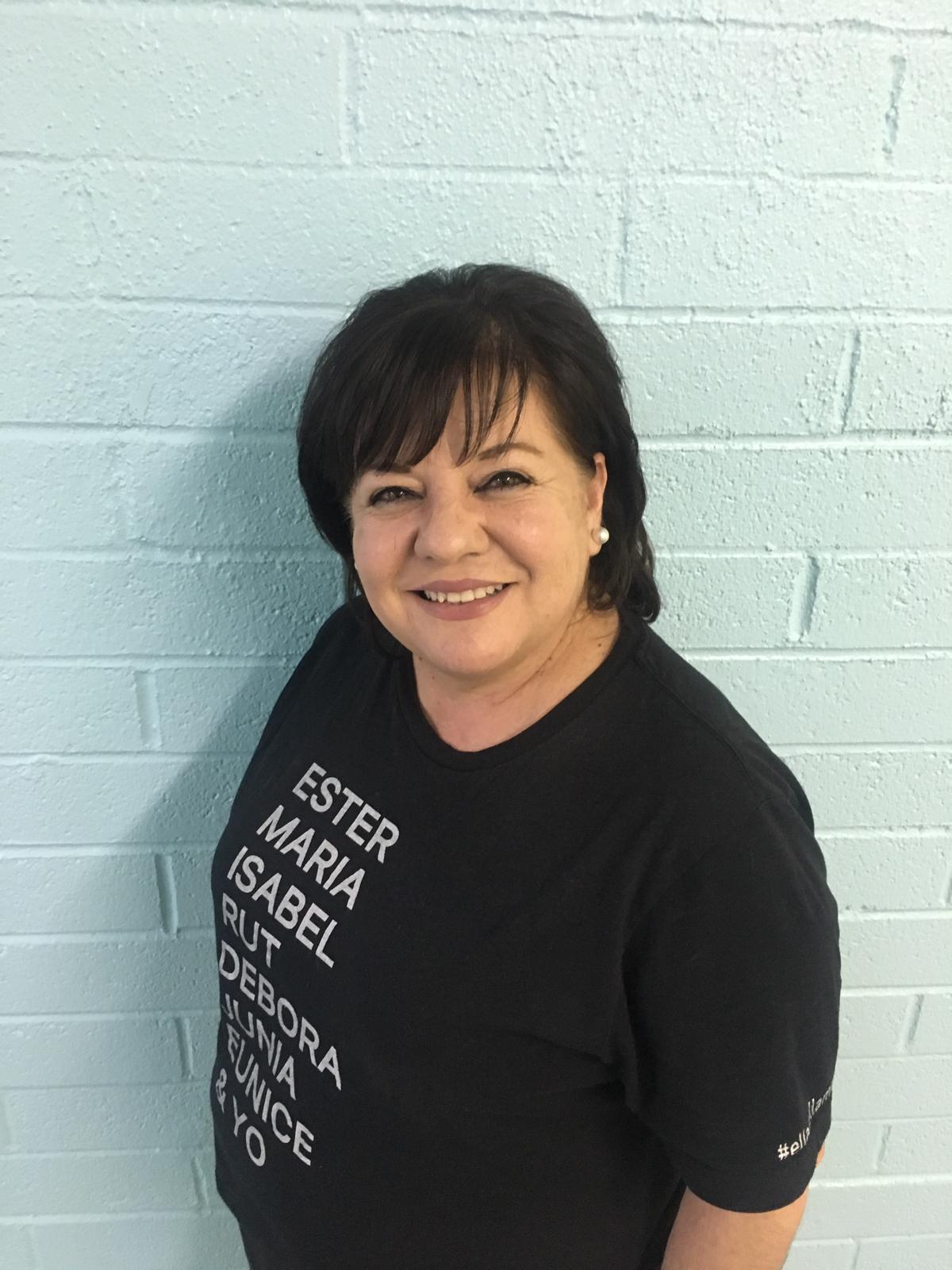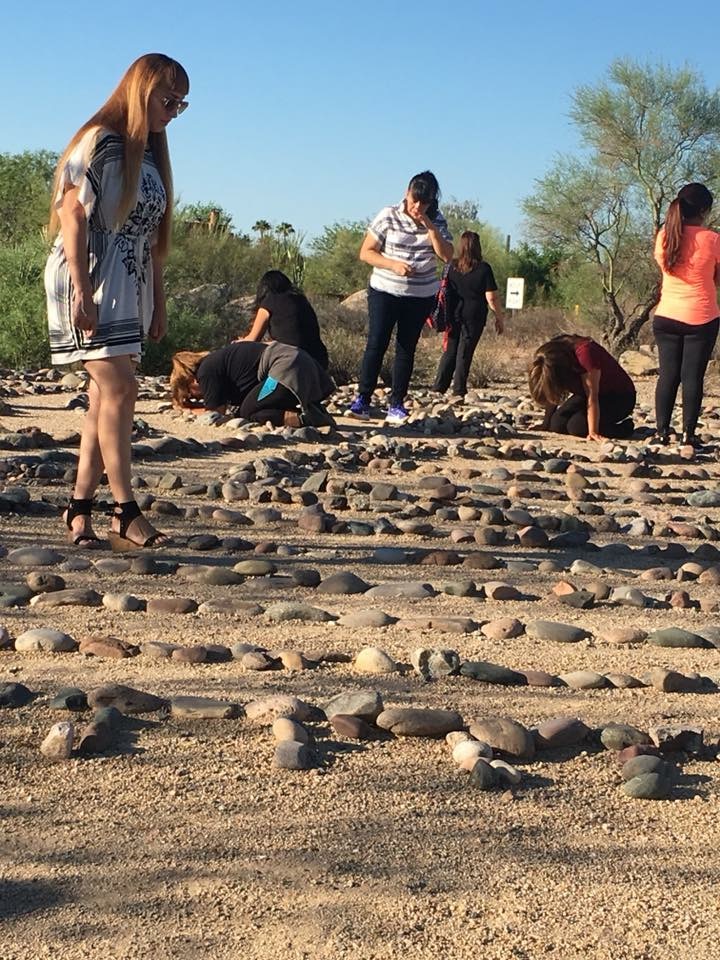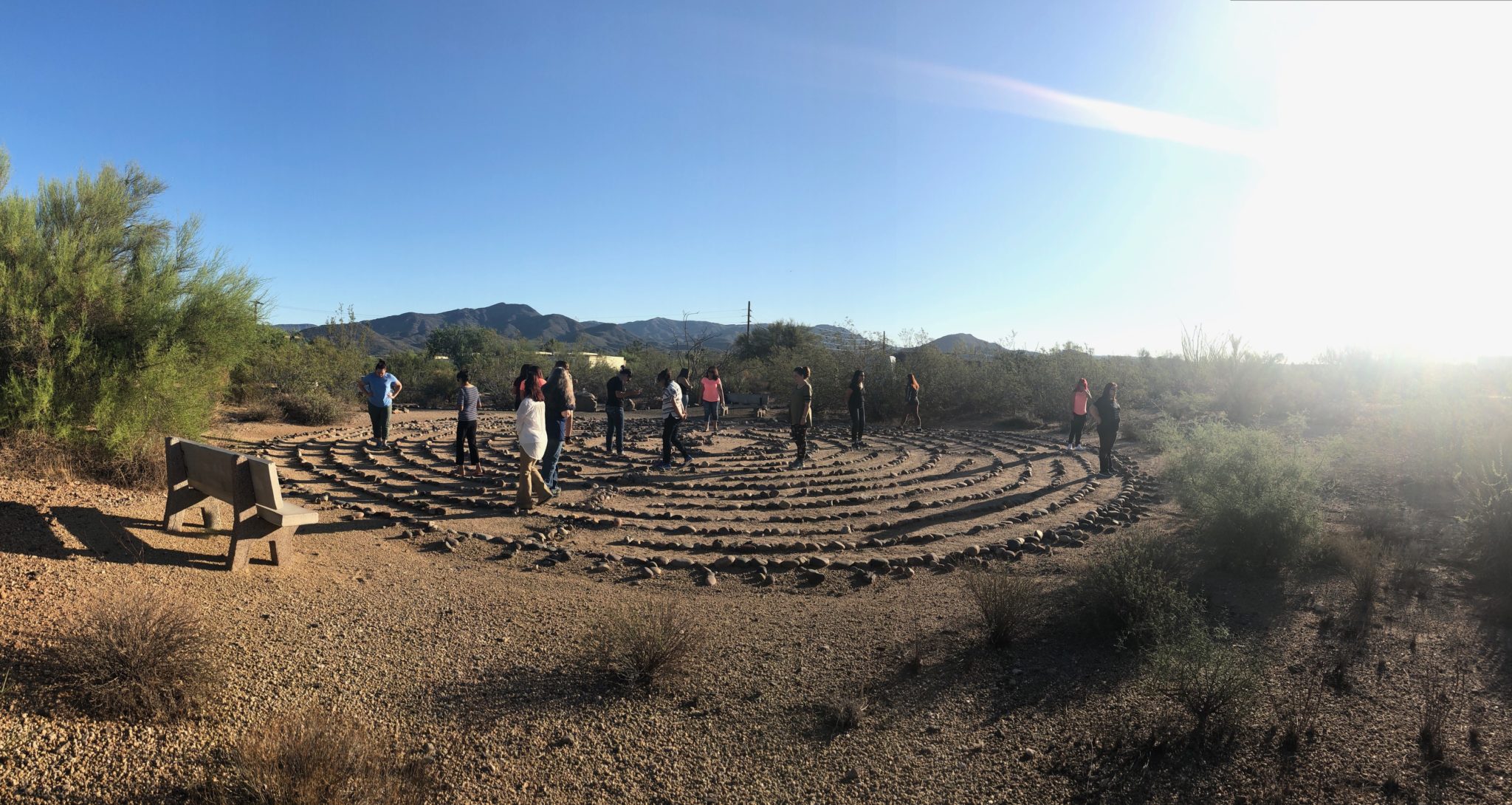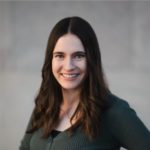R osy Tamayo had two enduring questions for God: Was she called to anything, and what was it for?
Last September, God gave Tamayo a clear answer to that first question: yes.
God’s answer came through a women’s leadership retreat in Carefree, Arizona. The She Is Called/Ella Es Llamada Leadership Collaborative Training and Spiritual Retreat was hosted by the Reformed Church in America. Tamayo was walking through a prayer labyrinth as part of the retreat, and there was a moment where she felt overcome with the presence of the Spirit. Tamayo fell on her knees and prayed.
“That was the Lord, confirming to me that I was called,” Tamayo says.
After she finished praying, she got up and kept walking until she came to a bench, far away from everyone else. From her bench, she could see the other women walking through the labyrinth.

Rosy Tamayo

Women walking the prayer labyrinth
“There was a small moment where all of them stopped,” Tamayo remembers. “God showed me something very beautiful in that moment. Leadership never stops. No matter what the circumstances, leadership continues because there are people who are coming up behind the leader. If the leader stops, everyone behind them stops. So you have to continue walking. That is the leadership that Lord has called me to. I could feel it with confidence.”
One of the retreat leaders, Marla Rotman, saw Tamayo crying and came over to her.
“She hugged me, and in her hug was a hug from God,” Tamayo says. “She made a cross on my forehead, and I thanked her because I was feeling God’s comfort and God’s security in her hug. She told me, ‘God is with you.’ And God was.”
Part of the retreat was focused on training women to facilitate leadership collaboratives, which are small groups of women who commit to grow together in biblical leadership through a year-long process. As Tamayo learned about the leadership collaborative model, she saw a picture of what God was calling her to do.
“My calling,” she says, “is to help other women to find their callings and to help them grow within themselves so that they can carry out their callings in ways that glorify God.”
The She Is Called/Ella Es Llamada bilingual retreat was facilitated by Lesley Mazzotta, the RCA Women’s Transformation and Leadership specialist; Liz Testa, coordinator for Women’s Transformation and Leadership; and Karla Camacho, an RCA church planter. During the retreat, they met with the women to answer questions and help discern next steps. Before committing to start a leadership collaborative, Tamayo wanted to be sure this was the way God was calling her to lead.
“I told them, ‘I will pray first. And if everything is okay with God, I will start in two weeks,’” Tamayo recalls. “And two weeks later, I started.”
For Tamayo, this commitment to listening for God’s guidance and letting God do the true leading has been a core part of the leadership collaborative journey.
“As I prepared to start the collaborative, I prayed to God, and I asked him to give me wisdom, to find a way, a simple way, but an efficient way, to be able to facilitate so that the women can learn leadership and pass it on,” she says. “I started searching through the other materials that I had. But I realized everything I needed was already in the leadership collaborative curriculum. I just simplified the format a little.”
Tamayo gathered a group of women from her church, Longview Community Church in Phoenix, Arizona, to participate in the leadership collaborative.
“Our goal as a collaborative is that we can have strong women be formed as leaders,” says Tamayo. “But it’s necessary that that fortitude comes from God. In difficult times, he will be our backing.”
This is not, Tamayo notes, where secular leaders find their strength. And that’s why she says it was important for the leadership collaborative to start by building a biblical foundation. The first stage of the process focuses on personal leadership.
“People always say leadership is influence, but what type of influence are we going to convey? A positive influence or a negative influence? That depends on our character. What type of character do we have? Because character is who we are,” says Tamayo. “And character has a base. Sometimes we forget that in leadership. That base is integrity, and even further, integrity also has a base. That base is in our faith.”
Tamayo says leadership’s biblical foundation is developed as leaders spend time “invest[ing] in communion with the Lord—the time we spend praying, when we meditate on the Word. [The] time to contemplate with God. We have spent that time since we started the collaborative—it has taken us six months to work on character because if the foundation isn’t established well, the leadership will be very wobbly. As I am a discipleship teacher, I always emphasize the devotional time and time alone with God. That’s the only way to have integrity, to be able to have our character formed according to Christ and be a good influence on others.”
The second stage of the leadership collaborative is organizational leadership. In this stage, participants ask themselves: once you’ve learned how to lead yourself, how do you lead others well? And the final stage of the leadership collaborative is focused on raising up other people to become leaders. But at each stage, Tamayo believes that the key difference between the kind of leadership God calls us to have and more secular approaches to leadership is in the foundation.
“That’s why I want to prepare women,” says Tamayo. “The only way to lead well is to lead for the glory of God. And you carry the leadership he wants through knowing him and knowing his Word and being obedient to it.”
Tamayo has already seen God work in the hearts of some of the women in the leadership collaborative.
“I’ve been able to see some of the young ladies open up their hearts and start healing because when they look at biblical leadership, they see how they have been damaged by other leaders and people in leadership and start to let go of that,” says Tamayo. “This is very helpful for them to find healing and continue moving forward toward their callings. There’s a phrase, ‘Alone we can do a little bit, but together, we can do many more things.’ And that’s the unity that God has called us to within leadership.”
God has worked through this experience to prepare Tamayo for the next chapter of her own leadership journey, too, she says. In fact, she and her husband, Carlos, have felt God calling them to church planting and are starting coursework at Western Theological Seminary. Tamayo’s commitment to this call has meant that she just recently stepped back from facilitating the leadership collaborative. Two other women in the group have taken up the mantle and are continuing to facilitate the group.
“Jesus came to my life when I was 14, and today, I’m 55,” says Tamayo. “In all my life, I knew I had a calling, but I never had it confirmed. Now I understand that age doesn’t matter. If I’m called, if God backs me up, he will use me. Now my husband and I are preparing ourselves to plant a church, and I believe God was preparing me for that calling through the leadership collaborative.”
Editor’s note: The interview was conducted through a translator; Tamayo’s comments were originally in Spanish.
Lead
Would you or another woman in your life benefit from developing the kind of leadership skills Rosy Tamayo champions? If so, contact Lesley Mazzotta, RCA Women’s Transformation and Leadership specialist, at lmazzotta@rca.org to learn more about future leadership collaborative opportunities.
Grace Ruiter co-founded Faithward and oversaw its growth from a small blog to a ministry that reaches 100,000-200,000+ people each month. She has been asking too many questions ever since she started talking, and she has no plans of stopping now. Although her curiosity has challenged her faith at times, it's also how her relationship with God has grown to where it is today. You can get in touch with Grace at graceruiterwrites@gmail.com.




